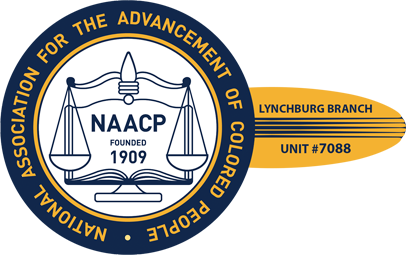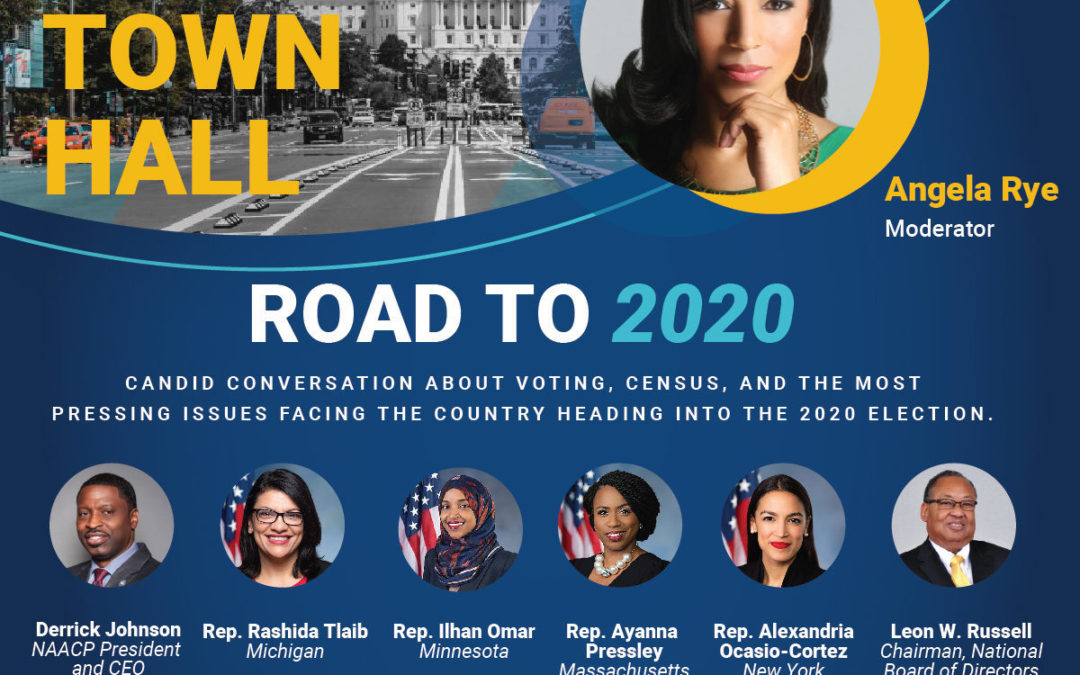
Moderated by Angela Rye, Rep. Alexandria Ocasio-Cortez, Rep. Ilhan Omar, Rep. Ayanna Pressley, and Rep. Rashida Tlaib discuss voting rights, 2020 and the upcoming presidential election
BALTIMORE (September 15, 2019) – On Wednesday, September 11, NAACP kicked off its involvement in the Congressional Black Caucus Foundation’s (CBCF) 49th Annual Legislative Conference (ALC) with a live town hall, tackling issues facing African American voters ahead of the 2020 election. Click here to watch.
Moderated by political strategist and CNN political commentator Angela Rye, the panel included members of Congress Rep. Alexandria Ocasio-Cortez (D-NY), Rep. Ilhan Omar (D-MN.), Rep. Ayanna Pressley (D-MA), and Rep. Rashida Tlaib (D-MI). NAACP President and CEO Derrick Johnson and Chairman of the NAACP National Board of Directors Leon W. Russell also joined the panel to offer remarks during the hour-long conversation that addressed issues including engaging communities of color in the electoral process, protecting voting rights, the 2020 Census, and the power of Black women in leadership.
“When we allow pundits to describe the victories of 2018 as a ‘wave’ or ‘magic,’ we are doing a disservice to our work and to our strategy. I don’t discredit my magic, but I know less about #BlackGirlMagic as I do #BlackWomanWork,” said Rep. Pressley, as she discussed the importance of amplifying the political work of Black women in creating policy and influencing elections.
Rep. Ocasio-Cortez also stressed the importance of not downplaying the political movements, policymaking and voter mobilization efforts of Black women.
“There’s a lot of talk around Black women voters but there needs to be more conversation about the Black woman’s agenda. Most often the priorities we see during elections don’t often translate enough into the legislations and the priorities we have as an agenda in Congress,” said Rep. Ocasio-Cortez. “We have to take that power we have as an electorate and demand that we have conversations centered on these issues.”
Reps. Omar and Tlaib reflected on the importance of engaging communities of color to become active in the democratic process—especially those who don’t think their vote matters.
“For new immigrants, particularly the Somalis, we are at about 90% voter participation,” said Omar. “The motivating factor is to treat them as equal and have a conversation with them. You must engage them and devote the proper resources.”
“I was raised rooted in the community and I will always surround myself with folks that know the trauma of being Black in America,” said Tlaib. “I have to surround myself with people of that lens. That’s the one thing that really drives me — to make sure I never sell out and always push back against the many forms of oppression.”
Addressing inequities and disparities that exist in congressional districts across the country, Rep. Pressley implored that audience to participate in the 2020 Census, saying,
“In the eyes of the federal government, if you are not counted, you don’t count. If there is one action item I can give you, it is to make sure you are counted, make sure the people in your lives are counted so you get the federal investment that you deserve. This money is critical for funding for public education, for language access, community development, block grants, public housing, and healthcare.”
NAACP leadership also participated in a number of panels on topics throughout ALC, including: The National Town Hall: 400 Years: Our Legacy, Our Possibilities, Black Women’s Roundtable Power of Black Women Policy Forum, Sojourner Truth Town Hall Bridging Pathways for Black Women in Leadership & Politics, Judiciary Braintrust, and Reclaiming Our Voices: Restoring Voting Rights in the 21st Century, and the Black Millennial Roundtable Discussion.
###
Founded in 1909, the NAACP is the nation’s oldest and largest nonpartisan civil rights organization. Its members throughout the United States and the world are the premier advocates for civil rights in their communities. You can read more about the NAACP’s work and our six “Game Changer” issue areas here.


Recent Comments